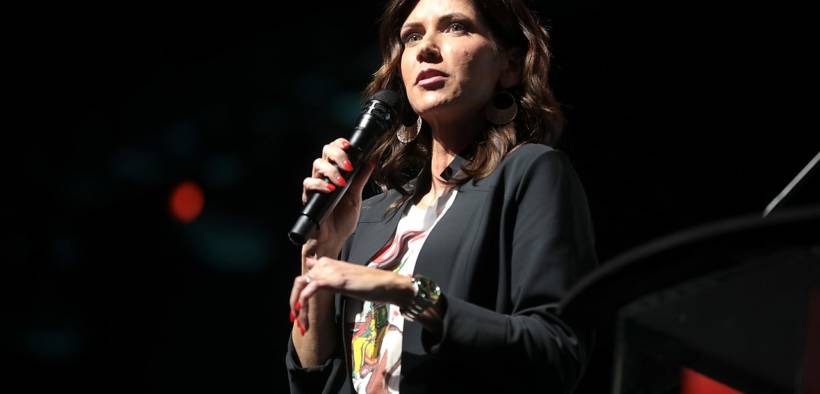Sioux Tribes Face Off with South Dakota Governor Over Coronavirus Checkpoints

“We have every legal right to do what we’re doing… We just don’t really have the resources to combat this virus once it gets into our lands.”
South Dakota Republican Governor Kristi Noem announced Monday she will take two Sioux tribes to federal court after they refused to lift coronavirus checkpoints to stop the spread of coronavirus into their tribal land.
The Oglala Sioux and Cheyenne River Sioux Tribes had received a warning on Friday from the state government. But, they said the road checkpoints were the most effective way to stop the spread of the deadly virus and have continued to carry out the checks.
Sparsely populated South Dakota has had 3,614 confirmed cases and 34 deaths linked to coronavirus. Governor Noem has resisted calls for a stay-at-home order across the state despite high-profile outbreaks in meat processing facilities.
Native American tribes across the country have been at odds with the federal government over coronavirus relief and public health support. Members of the 573 federally recognized American Indian and Alaska Native Tribes suffer from higher rates of coronavirus comorbidities than the average American, according to the Indian Health Service.
“I feel we have every legal right to do what we’re doing because in the past history and time after time, the lack of adequate healthcare for our people. We just don’t really have the resources to combat this virus once it gets into our lands,” said Harold Frazier Chairman of the Cheyenne River Sioux Tribe on MSNBC.
Sovereignty Dispute
Governor Noem has made the argument that the tribes are impeding agricultural business and essential services. In her Monday press conference, she said, “we do have people that have been going to these areas that have been involved in essential services that have not been allowed to go forward. We have people who live in tribal areas, and also have property there such as cattle or ranches and they’re not allowed to go there and check on their property or to do normal day-to-day business.”
But tribe leaders have outlined the requirements to enter the land both for residents and non-residents. Filling out a health questionnaire allows those who are conducting essential business to enter their land.
The U.S. Department of the Interior’s Bureau of Indian Affairs called on tribes to seek permission from state authorities before restricting travel.
Oglala Sioux President Julian Bear Runner said Noem’s posturing “threatened the sovereign interest of the Oglala people.”
The spat between state and federal authorities and Native American tribes also could have an impact on the Keystone XL pipeline which would pass through tribal land. Tribes in Montana and South Dakota filed a lawsuit against the federal government for approving the pipeline without considering the interests of the tribes.
The pipeline has been a contentious issue in environmental politics, and the federal government has been held up in the courts, and a Montana judge upheld his previous ruling canceling an important pipeline permit.
Tribal Health
Similar to the pipeline, Native American tribes are attempting to protect their people and land in the face of an adversarial federal government.
Many tribal lands have limited and underfunded medical facilities. Navajo Nation, the largest Native American tribal lands, has the highest per capita rate of coronavirus infection in the United States after New York.
“When you look at Indian Country, the health disparities are off the charts. There’s high rates of diabetes and heart disease, so if they get infected (with coronavirus), there’s a good chance they’re going to die,” said Kevin Allis, CEO of the National Congress of American Indians (NCAI).
Thus far, the Trump administration has favored Republican governors over Native American tribes in funding and support.
Bay Mills Indian Community Tribal Chairman Bryan Newland tweeted, “even after the law [coronavirus stimulus package] passed, the [Trump] Admin froze Tribes out of many of the provisions Congress included us in: PPP, PPE, & commercial fishing relief. The Admin is still blocking funds Congress & Courts said must go to tribal governments by end of April.”















